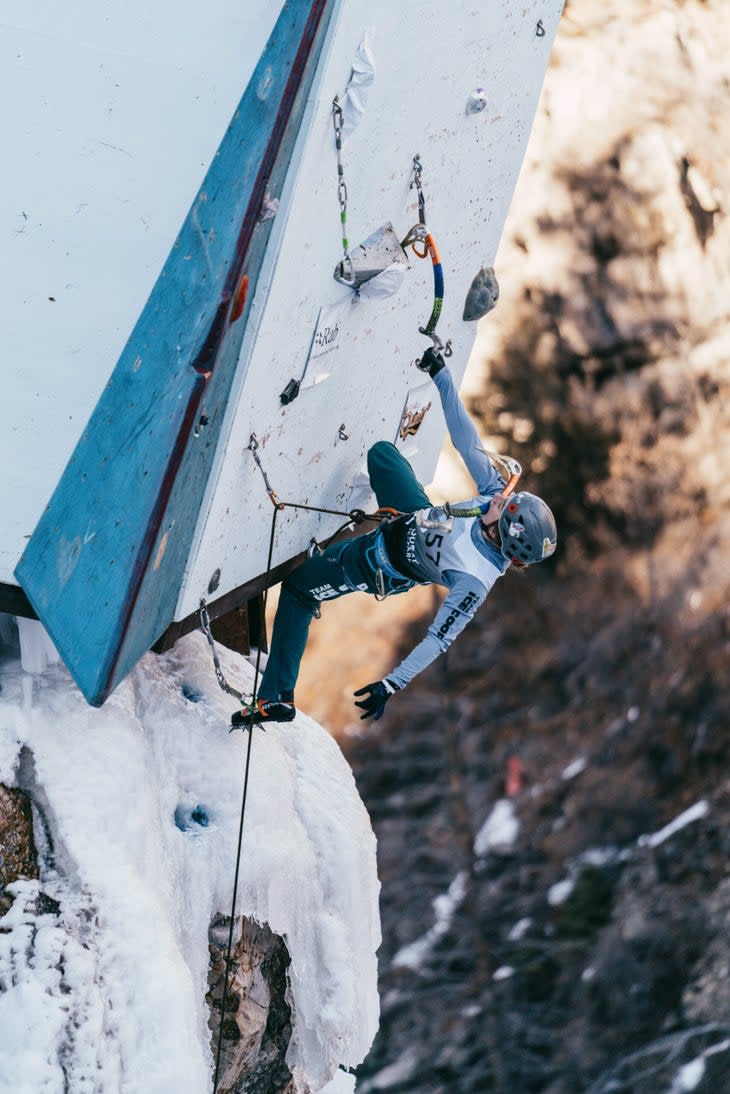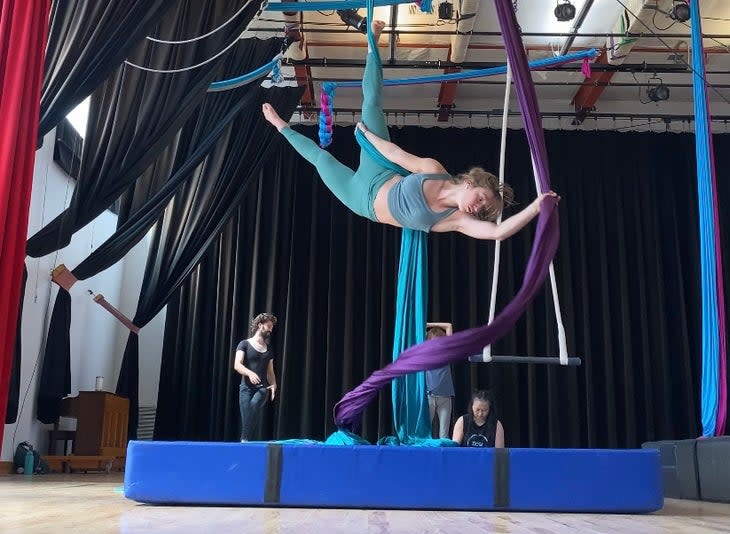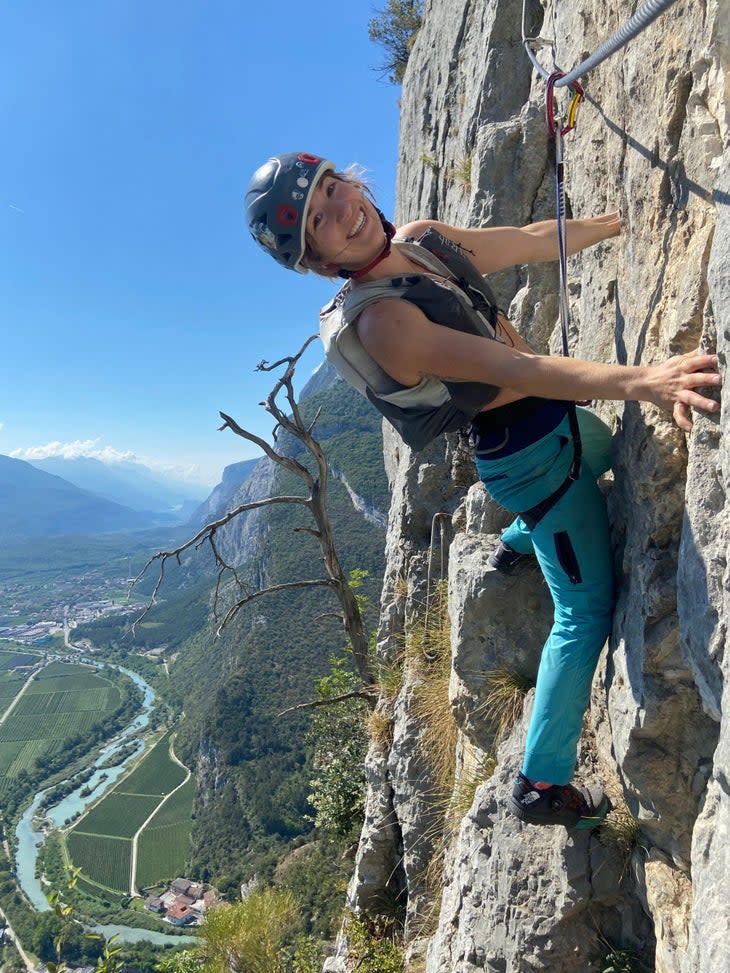The Best Thing I Ever Did for My Climbing Was Quit
This article originally appeared on Climbing
When I first started climbing at the age of 20, I convinced myself that the best way to get good was to climb all the time. After all, that's what all my heroes were doing. All those people on the internet. All those women on the posters, those men dangling from leathery fingertips in the Climbing Magazine ads. They were real athletes. Real climbers. Legends.
I was sure that these people--these paper heroes of mine--got good at climbing because they'd dedicated themselves to it with a single-minded devotion. They had discipline like I could never dream of. They lived in cars and caves, eschewing their worldly possessions and titles in the pursuit of their sport. To me, that felt like a revolutionary statement. A moral statement. A gospel.
If, as John Muir said, the mountains were a cathedral, then climbing was a prayer and the Stonemasters were hallowed saints. Perhaps it's no wonder that I found climbing in the same year that I lost my religion. Given the discipline, asceticism, and self-flagellation I saw elite athletes engaged in, climbing felt like an easy stepping stone from the strict brand of Catholicism I grew up with. I stopped going to church. I worshiped at a new altar now.
For the next eight years, I spent every free hour at the gym and every free weekend at the crag. I moved to Colorado so I could climb more. I quit my job and started freelancing so I'd have more time to train. In 2018, I started participating in local ice-climbing competitions. In 2019, I began competing internationally as a member of the U.S. Ice Climbing Team.

All this time, whenever I started to feel discouraged, I would retreat to a corner of my room and crack open a climbing magazine. I would run my own fingertips over the glossy images, touching the chalky hands of those who came before me to spread the Good Word.
Living in Boulder, Colorado, I was far from alone in my obsession. Everyone around me eschewed careers and relationships and regular meals in pursuit of vertical perfection. Likewise, I made climbing the axis of my life's orbit. I ate well and slept well. I climbed outdoors and indoors. I trained and competed, onsighted and redpointed, injured and rehabbed. I stretched. I hangboarded. I meditated. For a while, I even worked with a coach. I threw myself at climbing with a passion that verged on mania. I did everything I thought I was supposed to do.
But sometimes, I would notice, with a kind of detached curiosity, that the joy I found in climbing was dimmer than it used to be. I didn't feel giddy anymore when I got on the wall. I didn't feel triumphant when I sent.
I tried not to think about it. After eight years of devotion, I was too invested in this sport. I was too enamored with the idea that the only way to be a real climber was to give up everything else. I wouldn't even let myself think about the possibility of falling out of love. It wasn't an option. It couldn't be. Because climbing was all that I had. If I didn't have climbing, what would be left?
Then, after a certain point, I stopped getting better. A few years later, my progress reversed.
In 2020, I'd ended the competition season as the top-ranked female ice climber in North America. But in 2021, my performance nosedived. I used to feel euphoria whenever I left the ground. Now, I felt nothing. The light had gone out.
I was still following all the strict rules I'd set for myself, but it didn't seem to matter. I couldn't lift as much weight as I used to or stay on the wall as long. Instead of winning competitions, I was coming in last. Plus, the dimness was getting harder to ignore. Climbing either left me listless or tied up in knots of anxiety.
I remember walking into a team practice in January of 2022, just weeks before the legendary Ouray Elite Mixed Climbing Competition. I was nervous about defending my title, and lately, the waves of anxiety had been coming harder and faster. But still, I'd usually have to make a mistake to kickstart the negative spiral. Not this time. I'd barely begun to warm up when panic started to curl its tentacles around my lungs.
You're not good enough, my mind whispered to me as I stretched. You skipped a workout this week. You ate dessert last night. You call yourself a real climber? You're getting weaker by the day. You're a has-been. You're a failure. You're getting left behind.
I couldn't take it. About 20 minutes after entering the gym, I quietly packed up my things and walked out.
I couldn't understand what had happened to me. I blamed my body. I blamed my mind. It took me years to realize that the biggest thing holding me back was my approach: my unwavering devotion wasn't making me a better athlete or a better person. Instead, it was tearing me apart.
I'd thought that climbing would set me free. I'd thought that by following every rule perfectly, I would excel. But in swapping religion for climbing, I ended up in exactly the same place: pinned down by expectations, wracked with guilt, and finding only misery in a pursuit that had been sold to me as a source of joy.
Later that January, I cried on a sports psychologist’s couch, telling him I couldn’t even bear to tie in without feeling a surge of panic and dread. After the Ouray competition that February, I told all my climbing partners, somewhat vaguely, that I was taking a year off. But secretly I knew I was quitting for good.
Over this past year, I barely touched rock or ice. In some ways, all the things I was afraid of came true. During the first few months, I felt directionless. Without the 6:00 AM workouts, I no longer had a consistent routine. I wasn't motivated to maintain my strict sleep and nutrition regime. I watched my arms shrivel. I put on weight.

But my greatest secret fear was this: that, without climbing, my long-term partner and I wouldn't have anything to talk about anymore. We'd met through climbing. All our vacations were climbing vacations. Even when we didn't climb together, the sport--and the climbing lifestyle--were the threads that had held us together.
When I stepped back from the sport, I realized with a sickening ache that climbing had been more than a shared activity. It had been an impetus for deeper conversations about goals, passion, shame, and failure. Without it, we suddenly had no connection. We struggled to make conversation. And when we did talk, it was about different visions of a life well-lived. I wanted to move out of our van, maybe have kids. For him, adventure still came first.
After several months of strained silence, my partner and I split up. Some of my other climbing friendships suffered, but I didn't lose anyone else. Instead, my friends and I recalibrated. We found other things to do together and other things to talk about. Now, all those relationships are stronger than they ever were. Many of those friends, I found out, have struggled with the same questions I faced.
As we begin to enter our 30s, a number of my climbing partners have come to realize that the revered climbing lifestyle--with its emphasis on all-in devotion and type-II fun--simply isn’t sustainable. But realizing that and acting on it are two different things. It can be hard to redefine success and reorder your priorities without feeling shame about giving up or selling out.
Some of my friends were able to solve the problem simply by switching from competing to outdoor climbing, or by giving up the emotional intensity of projecting for laid-back gym sessions twice a week. But I needed more than that. I needed to give it all up in order to find out who I was without it.
So, I quit. I visited my grandma at Christmas for the first time in three years. I traveled to visit old friends. I took a Spanish class. I started running. I traveled to Arco with some friends and exclusively did via ferratas. I tried to learn how to dance. For a while, I felt embarrassed every time I walked into a climbing gym or got asked if I had any current projects. But over time, those feelings faded. I fell in love with other facets of life. And in the process, I fell back in love with life itself.

Now, I'm slowly, casually, starting to dip my toe into climbing again. It happened by accident: one friend asked me to come hang out and drink beers at a crag. Another asked me to teach her how to belay. Both times, it felt easy to say yes. Before long, I was on a rope--not because I felt like I had to, but because I wanted to.
These days, I climb at a lower level. Yet, I move better. I'm a better athlete, a smarter climber, and a safer partner. When I'm on the wall, I'm no longer afraid that my reputation hinges on every move. My mind isn't clattering with expectation and anxiety. Instead, it's quiet. It's open to more creative beta. And because I don't feel rushed, I take more time with my gear placements. I make fewer mistakes.
When you feel safe--both physically and emotionally--it's way easier to have fun.
That's been the beautiful and unexpected paradox of all this: giving up on the sport entirely freed me to actually love it for all the right reasons. And, in the long run, that’s made me a better climber than I ever was when I was grinding out hangboarding sessions three times per week.
But the best outcome is that now, I'm not afraid that stepping away from climbing will cost me everything. I have a stronger community than I ever have. I've met someone who I know will keep me talking and laughing even if we have nothing to do together but sit on a couch and grow old. And I know that if I ever decide to pursue a different hobby, I can stride wholeheartedly into that future without being afraid of losing myself.
These days, whenever someone asks me if I have a project, I just laugh.
"I'm retired," I say. And to me, that's the truth.
Corey Buhay is a Colorado-based writer and editor. Her work has appeared in Outside, Alpinist, Backpacker, Smithsonian, and The Denver Post. She is a co-author of Colorado Rockies: A Wildsam Field Guide.
Also Read
For exclusive access to all of our fitness, gear, adventure, and travel stories, plus discounts on trips, events, and gear, sign up for Outside+ today.

